人教版八年级英语上册单元笔记_I_(Unit1-Unit6)
八年级上册英语知识点总结unit 1-unit 6(复习提纲)

八年级上知识点总结unit 1-unit 6Unit 1: How often do you exercise?【复习目标】会使用频率副词及短语;能描述课余时间的活动安排;会描述基本饮食结构。
【语言目标】● What do you usually do on weekends?I sometimes go to the beach.● How often do you eat vegetables?Every day.● Most students do homework e very day.【重点词汇】●always, usually , often, sometimes , hardly , ever, never.●how often, once , twice , three times a week , every day.【应掌握的词组】1. go to the movies 去看电影2. look after = take care of 照顾3. surf the internet 上网4. healthy lifestyle 健康的生活方式5. go skate boarding 去滑板6. keep healthy=stay healthy 保持健康7. exercise=take(much)exercise=do sports锻炼8. eating habits 饮食习惯9. take more exercise 做更多的运动10. the same as 与什么相同11. be different from 不同12. once a month一月一次13. twice a week一周两次14. make a difference to 对什么有影响15. how often 多久一次16. although = though虽然17. most of the students=most students18. shop=go shopping=do some shopping 购物19. as for至于20. activity survey活动调查21. do homework做家庭作业22. do housework做家务事23. eat less meat吃更少的肉24. junk food垃圾食物25. be good for 对什么有益26. be bad for对什么有害27. want to do sth 想做某事28. want sb to do sth想某人做某事29. try to do sth 尽量做某事30. come home from school放学回家31. of course = certainly = sure当然32. get good grades取得好成绩33. some advice34. hardly=not nearly / almost not几乎不35. keep/be in good health保持健康36.be stressed out紧张的,有压力的37. take a vacation 去度假48.get back 回来【应掌握的句子】1. How often do you exercise? 你(你们)多久锻炼一次身体?How often + 助动词do(does或did) + 主语 + do sth.? 疑问词how often是问频率(多久一次),(在这里助动词do(does或did) 是起帮助构成疑问的作用)与一般现在时或一般过去时连用,回答一般是用表示频率的副词,如:once, twice, three t imes…, sometimes, often, quite often, usually, always, never, every day, once a week , twice a month , three times a month 等。
人教版八年级英语上册Unit6知识归纳

一.单元语法聚焦:一般将来时:表示将要发生的动作或状态及打算、计划准备要做饿事情,常与表示将来的时间状语连用。
㈠肯定结构:1.主语+be动词+going to+do动词原形(be动词要与主语人称保持一致)I (am) ,you/ we/ they (are), she/ he / it (is)2.主语+will + do动词原形Jim is going to play football.Jim will play football.㈡否定结构:be not going to do / will not (won’t) do㈢标志词:1.this+时间(this morning, this afternoon, this evening, this weekend…)2.next +时间(next weekend, next week, next year…) 3.Tomorrow, tonight, the day after tomorrow..㈣be going to 的用法:⑴be going to do sth 表示将来的打算、计划或安排。
⑵常与表示将来的tomorrow, next year等时间状语或when 引导的时间状语从句连用。
when引导的从句用一般现在时态。
⑶各种句式变换,句式变换借助be 动词完成,be随主语有am, is, are 的变换。
①肯定句:主语+ be going to + 动词原形+ 其他He is going to take the bus there when he is free.②否定句:主语+ be not going to + 动词原形+ 其他I’m not going to see my friends this weekend.③一般疑问句:Be +主语+ going to +动词原形+其他肯定回答:Yes, 主语+ be.否定回答:No, 主语+ be not.—Are you going to see your friends this weekend? —Yes ,I am. / No, I’m not.④特殊疑问句:疑问词+ be +主语+ going to +动词原形+其他?What is he going to do this weekend?When are you going to see your friends?⑷如果表示计划去某地,可直接用be going to+地点We are going to Beijing for a holiday..⑸表示位置移动的动词,如go , come, leave ,move等常用进行时表示将来时态表示近期打算做某事。
(完整版)人教版八年级英语上册各单元知识点归纳和作文范文

新课标八年级上册英语单元知识点归纳Unit1 Where did you go on vacation?短语归纳1.go on vacation去度假2.stay at home待在家里3.go to the mountains去爬山4.go to the beach去海滩5.visit museums 参观博物馆6.go to summer camp去参加夏令营7.quite a few相当多8.study for tests为测验而学习9.go out出去10.most of the time大部分时间11.have a good time doing=have fun doing =enjoy oneself玩得高兴12.of course=sure =certainly当然13.feel like给……的感觉;感受到14.go shopping去购物15.in the past在过去16.walk around四处走走17.because of+名词短语:因为because+句子18. a/one bowl of…一碗……19. the next day第二天20.drink tea喝茶21.find out找出;查明22.go on继续23.take photos照相24.something important重要的事25.up and down上上下下e up出来come out 出版发行27.go out with anyone 跟别人出去28.say about 发表对…看法29.rain hard 雨下得大30.too much+不可数名词太多too many+可数名词复数太多much too+形容词太用法:1.buy sth. for sb. / buy sb. sth.为某人买某物2.taste / look/sound/smell good. 尝起来/看起来/听起来/闻起来不错3.nothing…but+动词原形除了……之外什么都没有4.seem+(to be)+ adj. 看起来……5.arrive in+大地点/ arrive at+小地点/get to +地点/reach +地点到达某地6.decide to do sth.决定去做某事7.try doing sth.尝试做某事/ try to do sth.尽力去做某事8.forget doing sth.忘记做过某事/ forget to do sth.忘记做某事9.enjoy doing sth.喜欢做某事10. want to do sth.想去做某事11.start doing sth.开始做某事12.stop doing sth. 停止做某事13.dislike doing sth. 不喜欢做某事14.keep doing sth.继续做某事keep on doing sth 不停做某事15.Why not do. sth.=why don’t you do sth为什么不做……呢?16.so+adj.+that+从句如此……以至于……17.tell sb. (not) to do sth. 告诉某人(不要)做某事18.enough +名词,形容词+enough19.not really .真的没有。
(全)人教版八年级上册英语Unit6重点单词与重点短语(附例句)
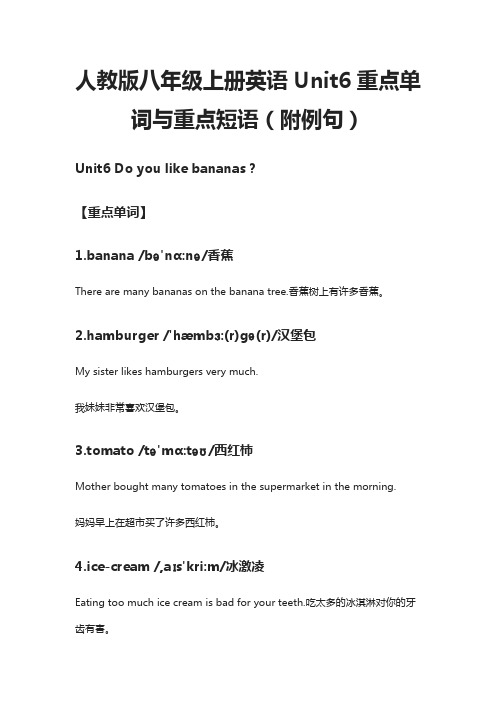
人教版八年级上册英语Unit6重点单词与重点短语(附例句)Unit6 Do you like bananas?【重点单词】1.banana /bə'nɑ:nə/香蕉There are many bananas on the banana tree.香蕉树上有许多香蕉。
2.hamburger /'hæmbɜ:(r)ɡə(r)/汉堡包My sister likes hamburgers very much.我妹妹非常喜欢汉堡包。
3.tomato /tə'mɑ:təʊ/西红柿Mother bought many tomatoes in the supermarket in the morning.妈妈早上在超市买了许多西红柿。
4.ice-cream /,aɪs'kri:m/冰激凌Eating too much ice cream is bad for your teeth.吃太多的冰淇淋对你的牙齿有害。
5.salad /'sæləd/沙拉The fruit salad is delicious.水果沙拉很美味。
6.strawberry /'strɔ:berɪ/草莓I like sweet and sour strawberries.我喜欢酸甜的草莓。
7.pear /peə(r)/梨Pear is a kind of fruit to quench thirst.梨是一种解渴的水果。
k /mɪlk/牛奶Grandfather is milking milk on the farm.爷爷在农场里挤牛奶。
9.bread /bred/面包Grandma likes to eat soft and sweet bread.奶奶喜欢吃又软又甜的面包。
10.birthday /'bɜ:(r)θdeɪ/生日I sang a happy birthday song at Tom's birthday party.我在汤姆的生日聚会上唱了一首生日快乐歌。
人教版八年级英语上册笔记1--10单元(原创整理,超详细)
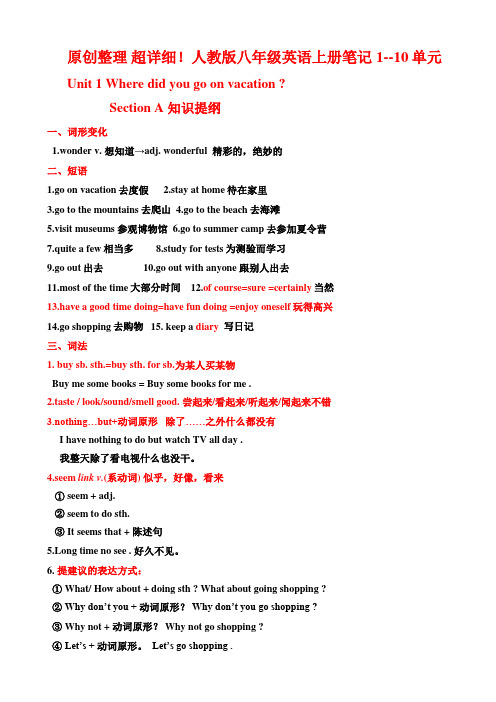
原创整理超详细!人教版八年级英语上册笔记1--10单元Unit 1 Where did you go on vacation ?Section A 知识提纲一、词形变化1.wonder v. 想知道→adj. wonderful 精彩的,绝妙的二、短语1.go on vacation去度假2.stay at home待在家里3.go to the mountains去爬山4.go to the beach去海滩5.visit museums 参观博物馆6.go to summer camp去参加夏令营7.quite a few相当多 8.study for tests为测验而学习9.go out出去 10.go out with anyone 跟别人出去11.most of the time大部分时间 12.of course=sure =certainly当然13.have a good time doing=have fun doing =enjoy oneself玩得高兴14.go shopping去购物 15. keep a diary 写日记三、词法1. buy sb. sth.=buy sth. for sb.为某人买某物Buy me some books = Buy some books for me .2.taste / look/sound/smell good. 尝起来/看起来/听起来/闻起来不错3.nothing…but+动词原形除了……之外什么都没有I have nothing to do but watch TV all day .我整天除了看电视什么也没干。
4.seem link v.(系动词) 似乎,好像,看来① seem + adj.② seem to do sth.③ It seems that + 陈述句5.Long time no see . 好久不见。
6. 提建议的表达方式:① What/ How about + doing sth ? What about going shopping ?②Why don’t you + 动词原形?Why don’t you go shopping ?③ Why not + 动词原形? Why not go shopping ?④Let’s + 动词原形。
人教版八年级英语上册unit6精讲笔记

• resolution n 决心,决定
• make a resolution 下决心 New Year’s resolution 新年决心 • — What’s your New Year’s _______? •—
I’m going to eat more vegetables. A. idea B. resolution C. job D. subject • have to do with关于;与„„有关系 have nothing to do with 与……没有关系 • ( ) I heard you ____ to do with the person. • A. have B. have nothing C. had D. has nothing
• ▲make sure to do sth 务必干
• ▲ make sure of sb./ sth 弄清楚某人/事
Practice:
Please check your paper to _______ there are no mistakes A. think of B. try out C. find out D. make sure
• 5. be sure about 确信
• make sure 确保
• (1) be sure +about / of +名词、代词或动名词
• 对……有把握
She is sure of success. 她确信会成功。
• (2) be sure to do sth 务必;确信
I’m sure to go with you. 我确信和你一起去
• We usually make a plan for work ____ every term.
Unit 6 知识点归纳-人教版八年级英语上册

人教版英语八年级上册第六单元语法与知识点归纳(跟随课本)Unit 6 I’m going to study computer science.一、短语突破:1、computer science计算机科学2、grow up长大3、want to be想成为4、computer programmer电脑程序设计员5、basketball driver公交车司机6、basketball player篮球运动员7、practice doing sth练习做某事8、be good at...擅长...9、write stories写故事10、tell stories讲故事11、keep on doing sth. 坚持做某事12、of course当然13、be sure about...对...确定14、make sure确信15、try your best尽你最大努力16、Study hard 努力学习17、finish doing sth.完成做某事18、school teacher学校老师19、soccer players足球运动员20、a car driver一个赛车手21、a fast car 一辆快车22、go to a cooking school去一所烹饪学校23、take acting lessons 上表演课24、study medicine学医学25、at a university在一个大学26、in London在伦敦27、next September下个九月\明年九月28、Write articles 写文章29、send ... to...将...记寄到某处30、New year's resolution新年决心33、next year明年34、learn to do sth.学会做某事35、make the soccer team 成为足球队的一员36、get good grades取得好成绩37、get lots of exercise 进行大量的运动38、take guitar lessons上吉他课39、foreign language外语40、make a resolution下定决心41、for example例如42、good reasons好的理由42、a kind of一种43、most of the time大多数时间44、make promises to sb.向某人承诺45、get back from school从学校回来46、the most common 最常见的47、at the beginning of...在...的开端48、write down写下49、the coming year来年50、different kinds of不同种类的51、eat less fast food少吃快餐52、have to do with...与什么有关53、take up开始去做、学着去做54、make a weekly plan制定周计划55、have one thing in common 有一个共同点56、for this reason因为这个原因57、the best resolution最好的决心58、the first resolution第一个决心59、one’s own某人自己的60、personal improvement自我提高61、physical health身体健康62、have to必须、不得不don't have to不必63、go to university上大学二、容易混淆的知识点、短语等突破。
人教版英语八年级上Unit1-6单元知识语法点大归纳

人教版英语八年级上Unit16单元知识语法点大归纳Unit1 Where did you go on vacation?【重点语法】不定代词:不指名代替任何特定名词或形容词的代词叫做不定代词。
用法注意:1. some 和any +可数名/不可数名。
some 多用于肯定句,any多用于否定句、疑问句和条件从句 。
有些问句中用some,不用any, 问话者希望得到对方肯定回答。
2. 由some, any, no, every 与 body, one, thing构成的复合不定代词作主语时,其谓语动词用三单。
3. 不定代词若有定语修饰,该定语要置于其后:如:something interestingUnit2 How often do you exercise?【重点语法】1. 频率副词: always, usually, often, sometimes, never频率副词在句中通常放在实义动词之前, be动词或助动词之后。
常用于一般现在时态中。
2.“次数”的表达方法一次 once, 两次twice,三次或三次以上:基数词+ times, 如:three times, five times,3. how often“多久一次”问频率,回答常含有频率词组或短语。
常见的how疑问词:1)How soon 多久(以后)—How soon will he be back?他多久能回来?—He will be back in a month. 他一个月后能回来。
2)how long “多久”—How long did it take you to clean the house? 你打扫房子用了多久? —It took me half an hour to clean the house. 我打扫这房子用了半小时。
3)How many+名复How much+不可名“多少” 问数量(how much 还可问价格)Unit3 I’m more outgoing than my sister.【重点语法】1. 形容词和副词的比较等级(1)形容词和副词的原形就是原级(2)比较级,表示较……或更……(3)最高级, 表示最...。
人教新目标八年级英语上册思维导图课堂笔记Unit 1 Where did you go on vacation

Unit 1 Where did you go on vacation?2013版人教新目标八年级英语上册思维导图课堂笔记1. anyone pron. 任何人I don’t want anyone to touch the book.我不想让任何人碰这本书。
•someone某人2. anywhere adv.在任何地方Did you go anywhere interesting?你去过任何有趣的地方吗?•nowhere无处,哪里都不3. wonderful adj. 精彩的;绝妙的I think the talk shows are wonderful.我认为访谈节目很精彩。
•近:fantastic极好的4. few adj. & pron不多;很少Few of us know the truth.我们当中没有几个人知道真相。
Very few students learn Latin now.现在学拉丁语的学生很少。
•本身含有否定•quite a few极好的•a few一些,有些•little不多的•a little一些,少量的5. most adj.,adv.&pron. 最多的;大多数Most students of these school are girls.这所学校的大多数学生是女生。
Who did most carefully Lucy,Lily or Tom?谁做的最认真露西、莉莉还是汤姆?Most of the students want to study abroad nowadays.如今大多数学生想去国外学习。
•most of the +复数名词/不可数名词•most of +代词(宾语)•most of +物主代词+复数名词/不可数名词•most of …作主语时,谓语动词的数与of后的词在形式上保持一致6. something pron. 某事;某物I want something to eat.我想要一些吃的东西。
人教版八年级英语上册1-10单元学霸笔记

⼈教版⼋年级英语上册1-10单元学霸笔记Unit1单元⼩结⼀、重点单词:anyone, wonderful, something, nothing, myself, bored, someone, diary, enjoyable, activity, decide, bird, bicycle, building, trader, wonder, difference, wait, umbrella, below, enough, hungry, duck, dislike⼆、词性变换:me (反⾝代词)enjoy (形容词)decide (名词)build (名词)difference (形容词)wet(反义词)hungry(名词)like (反义词)expensive(反义词)wonder (形容词)active (名词)三、重点短语:go on vacation, stay at home, go to the mountains, visit museums, go out, take photos, quite a few, of course, something special, have a good/fun time, feel like, walk up to, because of, decide to do, ride bicycles to, make notes, find out, go on, come up. study fora test, long time no see, most of the time, arrive in, along the way, go to the beach, upand down,四、重点语法结构:1.⼀般过去时态(标志词,句式)I was a middle school student two years ago.He went to the beach yesterday.2.不定代词⽤法--thing,指物,--one,指⼈。
人教版八年级上各单元英语笔记
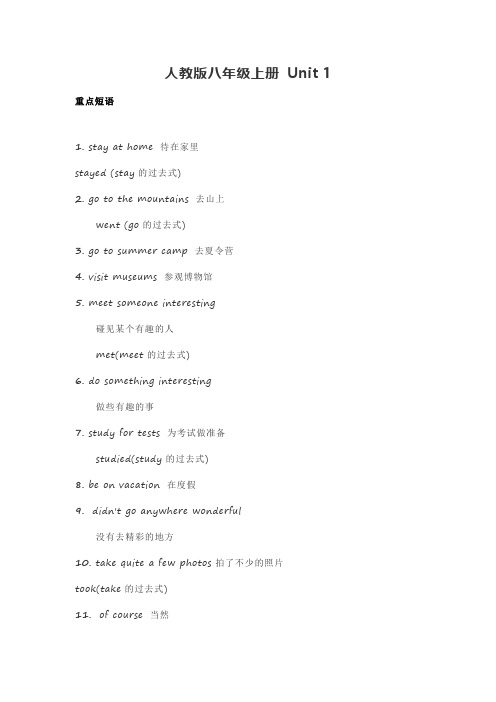
人教版八年级上册Unit 1 重点短语1. stay at home 待在家里stayed (stay的过去式)2. go to the mountains 去山上went (go的过去式)3. go to summer camp 去夏令营4. visit museums 参观博物馆5. meet someone interesting碰见某个有趣的人met(meet的过去式)6. do something interesting做些有趣的事7. study for tests 为考试做准备studied(study的过去式)8. be on vacation 在度假9. didn't go anywhere wonderful没有去精彩的地方10. take quite a few photos拍了不少的照片took(take的过去式)11. of course 当然12. go to a friend's farm 去朋友的农场13. in the countryside 在乡下14. feed some hens and see some baby pigs 喂母鸡和看到一些小猪仔fed(feed的过去式);saw(see的过去式) 15. seem to be bored 看上去很无聊It seems that... 看来……16. keep a diary/keep diaries 记日记kept(keep的过去式)17. an activity 一次活动activities(activity的复数形式)18. an expensive gift 一份昂贵的礼物19. an exciting vacation一个令人兴奋的假期20. buy sth. for sb.=buy sb. sth. 为某人买某物bought(buy的过去式)21. have a good time 玩得开心have a good time doing sth. 做某事开心22. find something enjoyable 找点乐子found(find的过去式)23. arrive in (+大地方)/arrive at (+小地方)get to (+地方)reach (+地方)到达……24. decide to go to the beach 决定去海滩decide to do sth. 决定做某事25. try to do sth. 尽力做某事try doing sth. 尝试做某事have a try 尝试一下26. feel like sth. 感觉像某物feel like doing sth. 想做某事27. ride bicycles to sp. 骑自行车去某地rode(ride的过去式)28. a lot of new buildings 许多新建筑物29. the houses of the Chinese traders中国商人的房子30. enjoy walking around 喜欢到处走走31. walk up to the top 走到山顶32. wait over an hour for the train等火车一个多小时33. rain hard 雨下得大34. be/get wet 淋湿got(get的过去式)35. have an umbrella 有一把雨伞36. because of 因为;由于37. can't see anything below看不见下面的东西38. bring enough money 带足够的钱brought(bring的过去式)39. along the way 沿途40. another two hours=two more hours再两小时41. in the shopping center 在购物中心42. on our school trip 在我们学校郊游中43. a bag with food and water一个装着食物和水的袋子44. find out 弄清楚;查明白45. so... that...如此……以至于……46. Beijing duck 北京烤鸭47. keep doing sth. 继续做某事48. go on 继续49. jump up and down in excitement兴奋得跳上跳下50. start to come up 开始出现重点句型1. Long time no see. 好久不见。
新人教版八年级上册英语_1-6单元基础知识总结
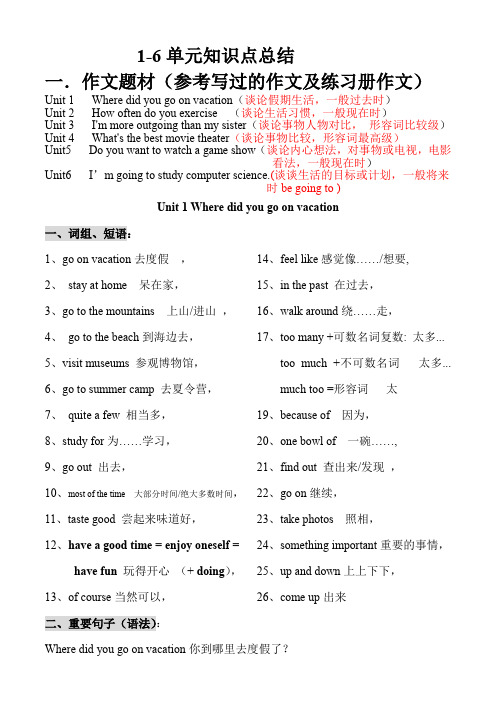
1-6单元知识点总结一.作文题材(参考写过的作文及练习册作文)Unit 1 Where did you go on vacation(谈论假期生活,一般过去时)Unit 2 How often do you exercise (谈论生活习惯,一般现在时)Unit 3 I'm more outgoing than my sister(谈论事物人物对比,形容词比较级)Unit 4 What's the best movie theater(谈论事物比较,形容词最高级)Unit5 Do you want to watch a game show(谈论内心想法,对事物或电视,电影看法,一般现在时)Unit6 I’m going to study computer science.(谈谈生活的目标或计划,一般将来时be going to )Unit 1 Where did you go on vacation一、词组、短语:1、go on vacation去度假,2、stay at home 呆在家,3、go to the mountains 上山/进山,4、go to the beach到海边去,5、visit museums 参观博物馆,6、go to summer camp 去夏令营,7、quite a few 相当多,8、study for为……学习,9、go out 出去,10、most of the time 大部分时间/绝大多数时间,11、taste good 尝起来味道好,12、have a good time = enjoy oneself =have fun 玩得开心(+ doing),13、of course当然可以,14、feel like感觉像……/想要,15、in the past 在过去,16、walk around绕……走,17、too many +可数名词复数: 太多...too much +不可数名词太多...much too =形容词太19、because of 因为,20、one bowl of 一碗……,21、find out 查出来/发现,22、go on继续,23、take photos 照相,24、something important重要的事情,25、up and down上上下下,26、come up出来二、重要句子(语法):Where did you go on vacation你到哪里去度假了?I went to New York City.我去了纽约城Did you go out with anyone 你出去带人吗?No, No one was here. Everyone was on vacation.不,没有人在这儿。
人教版八年级上册英语第6单元预习和期末复习总结

人教版八上unit 6Unit 6 I’m going to study computer science.(一)短语和句型知识点Section A 1a-1c1.be going to do sth.开始做某事puter science计算机科学,信息技术3.study computer science学习计算机科学,学习信息技术4.want to be a\an +表职业的词想要成为(当)5.grow up长大6.a computer programmer一名电脑程序师,电脑程序设计员7.bus driver公交车司机,公共汽车司机8.basketball player篮球运动员9.take acting lessons上表演课10.practice basketball训练(练)篮球11.every day每天12.study hard=work hard学习努力,工作努力13.go to the doctor=see a doctor去看医生1.I’m going to study computer science.句型:be (am,is,are) going to +v-原形,打算做,计划做,将要做1)I am going to go(go) fishing this weekend.2)He is going to go (go) shopping tomorrow.2.What do you want to be when you grow up?句型:want to do sth.想要做某事1)Jim wants to go (go) to the beach.2)We want to go (go) to Penang Hill.【1a】puter programmer计算机程序设计员,编程人员,计算机程序师常见的表示职业的单词:工程师engineer,公交车司机bus driver,篮球运动员basketball player,厨师cook,老师,教师teacher,飞行员pilot,科学家science,医生doctor,小提琴手violinist,钢琴家pianist,演员,男演员actress,女演员actress,音乐家musician,艺术家,美术家artist,作家writer,歌手,歌唱家singer,舞者,舞蹈家dancer,记者reporter,魔术师magician,牙医dentist,农民,农夫farmer,男警察policeman,女警察policewoman.【1c】4.I’m going to practice basketball every day.句型:practice doing sth.练习做某事1)I practice speaking (speak) English every day.2)I want to practice playing (play) the guitar.Section A 2a-2d1.want to be a teacher想当一名老师2.move to Shanghai搬到上海3.how to teach children怎样教孩子4.finish high school高中结束(毕业)5.finish college大学结束(毕业)6.the Old Man and the Sea《老人与海》7.By Hemingway被海明威写的,海明威写的8.want to be a writer想当一名作家9.become a writer成为一名作家10.keep on doing sth.继续做,坚持做某事11.write stories写故事,编故事12.of course=sure=certainly当然13.want sb. to do sth.想要做某事14.want sb. to be a doctor想要某人当医生15.be sure about\ of确信,对......有把握16.I’m not sure.我不确定,我不敢肯定,我没把握。
Unit6重点单词词组句子和作文人教版英语八年级上册(1)
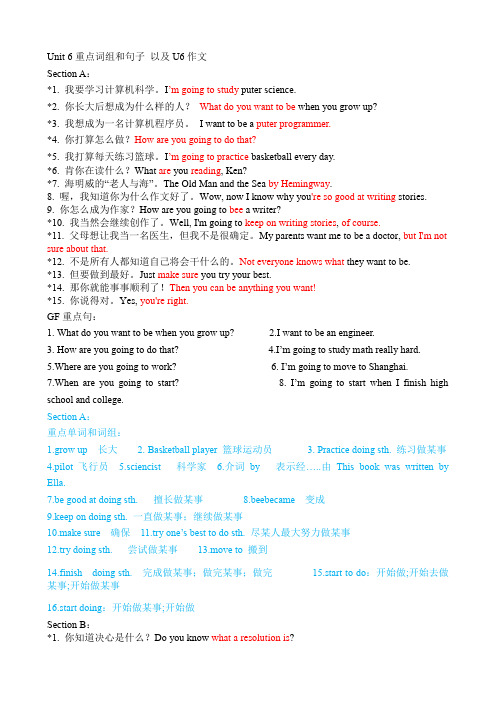
Unit 6重点词组和句子以及U6作文Section A:*1. 我要学习计算机科学。
I’m going to study puter science.*2. 你长大后想成为什么样的人?What do you want to be when you grow up?*3. 我想成为一名计算机程序员。
I want to be a puter programmer.*4. 你打算怎么做?How are you going to do that?*5. 我打算每天练习篮球。
I’m going to practice basketball every day.*6. 肯你在读什么?What are you reading, Ken?*7. 海明威的“老人与海”。
The Old Man and the Sea by Hemingway.8. 喔,我知道你为什么作文好了。
Wow, now I know why you're so good at writing stories.9. 你怎么成为作家?How are you going to bee a writer?*10. 我当然会继续创作了。
Well, I'm going to keep on writing stories, of course.*11. 父母想让我当一名医生,但我不是很确定。
My parents want me to be a doctor, but I'm not sure about that.*12. 不是所有人都知道自己将会干什么的。
Not everyone knows what they want to be.*13. 但要做到最好。
Just make sure you try your best.*14. 那你就能事事顺利了!Then you can be anything you want!*15. 你说得对。
人教版初中英语-八年级上册-unit6知识点+练习

⼈教版初中英语-⼋年级上册-unit6知识点+练习初中英语题集⼋年级上 Unit6知识点⼀:词汇变形1.play – player2.drive – driver3.cook – cook (厨师)/ cooker (炊具;炉灶)4.science –scientist5.violin-violinist6.piano-pianist7.foreign-- foreigner/doc/41bc2ceb6ad97f192279168884868762cbaebbf7.html cate (v.)-- education (n.)—educational (adj.)9.send—sent—sent10.begin—beginning11.improve(v.)—improvement(n.)12.week(n.)—weekly (adv.)13.discuss(v.)—discussion(n.)14.person(n.)—personal(adj.)15.they—themselves(反⾝代词【典型例题】例题1.1.They enjoyed _________(them) at the party last night.讲透考点:考查反⾝代词。
讲透本题:根据句意,本句要表达玩得开⼼。
故短语enjoy oneself 可以表达,再根据已给的词them,所以答案:themselves.例题2.2.Age is a _______(person)problem in the West. Don’t talk about it.讲透考点:形容词的转化。
讲透本题:根据句意,年龄在西⽅是⼀个私⼈的问题,所以person 要转换为七形容词形式personal.例题3.3.At the _______ (begin) of the book, the writer told us a story.讲透考点:词性的转换讲透本题:根据本单元的短语at the beginning 可知该题答案为beginning.相似题:1.Tom is good at ___________ and he wants to be a ___________ when he grows up.(science)2. Everyone should try ___________ themselves because the ___________ is important for us.(improve)3. Student Times is a ___________newspaper. It comes out on Tuesday each ___________.(week)4. They ___________ to make a soccer team as a their New Year’s resolution at the ___________ of last year.(begin)5. I am going to ___________ with my co-workers about the plan. I really wonder what our ___________ will be like? (discuss)答案:1.science scientist 2. to improve improvement 3. weekly week4.began beginning5. discuss discussion知识点⼆:重点短语及句式句型1.be sure about 对某事有把握2.be able to 能够做.....3.in common 共同4.take up 学着做;开始做5.hardly ever ⼏乎不6.Practice doing sth 练习做某事7.Keep on doing sth 不断做某事8.Promise to do sth 答应去做某事9.have to do with关于;与有关系10.-- What do you want to be when you grow up?-- I want to be an engineer11.-- How are you going to do that?-- I’m going to study math really hard【典型例题】例题1.1. Do you want to a doctor when you're older?A. isB. areC. beD. am讲透考点:want to do/be 想做什么事或想成为…讲透本题:根据句意想成为⼀名医⽣,故答案选C.例题2.2. What are you this evening?A. going toB. going to doingC. going to doD. go to do讲透考点:⼀般将来时be going to do 的表达讲透本题:根据时间状语this evening, 该句要⽤⼀般将来时,再看选项be going to do, 故答案选C.相似题:1. Paul wants an actor because he likes acting.A. to beB. beC. becomeD. becoming2. M y sister art when she grows up because she wants to be anartist.A. studiesB. is going to studyC. studiedD. studying3. your brother a magazine from thelibrary?A. Are; going to borrowB. Is; going to borrowC. Will; borrowsD. Are; going to borrows4. --- next year?--- She is going to learn more about English.A. When is she going to learn more about EnglishB. What does she doC. What's she going to doD. Where is she going to do5. --- ?--- I am going shopping.A. What are you going to doB. When are you goingC. Where are you goingD. Who are you going with6. --- David, why are you so excited?--- My father has made a that he will take me to Tibet next month.A. faceB. promiseC. mistake7. The little girl was unable her name.A. to writeB. to writingC. writeD. writing8. --- I don't think that animals should live in zoos.--- . The animals need freedom.A. I agree with youB. I disagree with youC. I agree to youD. I disagree to you答案: 1. A 2. B 3. B 4. C 5. A 6. B 7. A 8. A知识点三:重点语法1.be going to的⽤法(1)be going to是⼀种固定结构,它后⾯要接动词原形,⽤来表⽰按计划或安排要发⽣的事情,含有be going to结构的句⼦中往往有表⽰将来的时间状语。
人教版八年级英语上册单元笔记 I(Unit1-Unit6) 本人原创
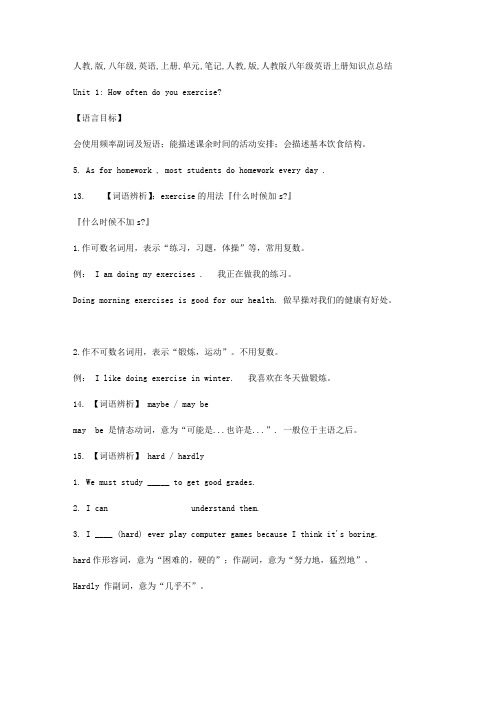
人教,版,八年级,英语,上册,单元,笔记,人教,版,人教版八年级英语上册知识点总结Unit 1: How often do you exercise?
【语言目标】
会使用频率副词及短语;能描述课余时间的活动安排;会描述基本饮食结构。
5. As for homework , most students do homework every day .
13. 【词语辨析】:exercise的用法『什么时候加s?』
『什么时候不加s?』
1.作可数名词用,表示“练习,习题,体操”等,常用复数。
例: I am doing my exercises . 我正在做我的练习。
Doing morning exercises is good for our health. 做早操对我们的健康有好处。
2.作不可数名词用,表示“锻炼,运动”。
不用复数。
例: I like doing exercise in winter. 我喜欢在冬天做锻炼。
14. 【词语辨析】 maybe / may be
may be 是情态动词,意为“可能是...也许是...”. 一般位于主语之后。
15. 【词语辨析】 hard / hardly
1. We must study _____ to get good grades.
2. I can understand them.
3. I ____ (hard) ever play computer games because I think it's boring. hard作形容词,意为“困难的,硬的”;作副词,意为“努力地,猛烈地”。
Hardly 作副词,意为“几乎不”。
八年级上册英语各单元知识点大归纳(必打印版)
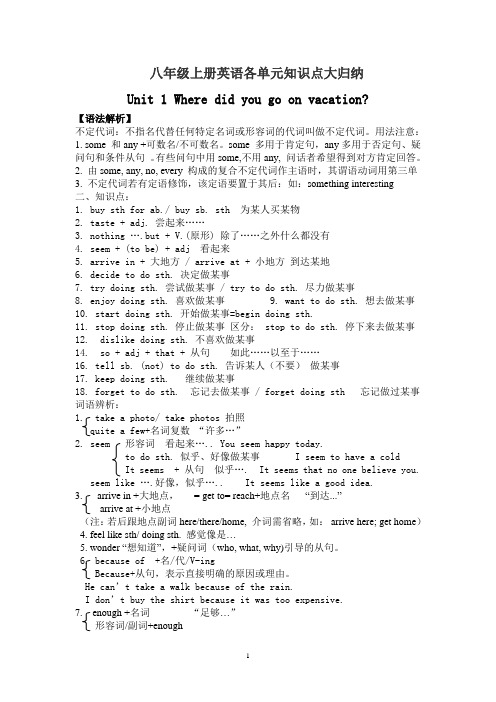
八年级上册英语各单元知识点大归纳Unit 1 Where did you go on vacation?【语法解析】不定代词:不指名代替任何特定名词或形容词的代词叫做不定代词。
用法注意:1. some 和any +可数名/不可数名。
some 多用于肯定句,any多用于否定句、疑问句和条件从句。
有些问句中用some,不用any, 问话者希望得到对方肯定回答。
2. 由some, any, no, every 构成的复合不定代词作主语时,其谓语动词用第三单3. 不定代词若有定语修饰,该定语要置于其后:如:something interesting二、知识点:1. buy sth for ab./ buy sb. sth 为某人买某物2. taste + adj. 尝起来……3. nothing ….but + V.(原形) 除了……之外什么都没有4. seem + (to be) + adj 看起来5. arrive in + 大地方 / arrive at + 小地方到达某地6. decide to do sth. 决定做某事7. try doing sth. 尝试做某事 / try to do sth. 尽力做某事8. enjoy doing sth. 喜欢做某事 9. want to do sth. 想去做某事10. start doing sth. 开始做某事=begin doing sth.11. stop doing sth. 停止做某事区分: stop to do sth. 停下来去做某事12. dislike doing sth. 不喜欢做某事14. so + adj + that + 从句如此……以至于……16. tell sb. (not) to do sth. 告诉某人(不要)做某事17. keep doing sth. 继续做某事18. forget to do sth. 忘记去做某事 / forget doing sth 忘记做过某事词语辨析:1. take a photo/ take photos 拍照quite a few+名词复数“许多…”2. seem 形容词看起来….. You seem happy today.to do sth. 似乎、好像做某事 I seem to have a coldIt seems + 从句似乎…. It seems that no one believe you.seem like ….好像,似乎….. It seems like a good idea.3. arrive in +大地点,= get to= reach+地点名“到达...”arrive at +小地点(注:若后跟地点副词here/there/home, 介词需省略,如:arrive here; get home)4. feel like sth/ doing sth. 感觉像是…5. wonder “想知道”,+疑问词(who, what, why)引导的从句。
- 1、下载文档前请自行甄别文档内容的完整性,平台不提供额外的编辑、内容补充、找答案等附加服务。
- 2、"仅部分预览"的文档,不可在线预览部分如存在完整性等问题,可反馈申请退款(可完整预览的文档不适用该条件!)。
- 3、如文档侵犯您的权益,请联系客服反馈,我们会尽快为您处理(人工客服工作时间:9:00-18:30)。
人教版八年级英语上册知识点总结Unit 1: How often do you exercise?【语言目标】会使用频率副词及短语;能描述课余时间的活动安排;会描述基本饮食结构。
1.how often”是一个特殊疑问词。
所谓的“频率”指的是某个动作多长时间/多久发生一次。
试比较:How often do you swim ?你多久游一次泳?How often does your father go to a movie?你爸爸多久看一次电影?针对“how often”引导的问句所进行的回答:twice a week, three times a month如always ,usually, often, sometimes, hardly ever, never.例:对划线部分提问:He always takes a bus to school. 注:划线部分都是对“频率”的描述,所以答案为How often does he take a bus to school?He never takes a bus to school.2.I always go shopping . Go +V-ing 表示“去xx”。
常见形式还有:go swimming,I often go skateboarding. go fishing,go walking...3.I can't stand shopping. 我无法忍受购物。
“意为:无法忍受xxx 。
特别注意:stand 后跟V-ing 形式。
对比复习介意xxx".例:Can you stand _______(hang) out with that silly boy?My father doesn't mind _______ (shop) this afternoon.4.]]],常用于句首,其后跟名词、代词或例:As for him,I never want to see him here. 至于他,我永远不希望在这里见到。
6.“对xx有好处”其反义说法为:“对xx有坏处”例:Playing sports is good for middle school students. 做运动对中学生有好处。
_______ (learn) English.Reading in bed is bad for your eyes.注意复习:be good at 擅长xxx7. But I'm pretty healthy. 但是我相当地健康。
"unhealthy"8.I try to eat a lot of vegetables. 我尽力吃大量的蔬菜。
"尽力去xxx" 例:My pen pal always tries to tell jokes .“尝试去Why don't you try talking with him?9.I look after my health.10.我的健康的生活方式帮助我取得好成绩。
好食物和锻炼帮着我更好地学习。
帮助某人做某事?xxx相同”不同"例:My study habits are the same as my sister's .Do you think Li Lei's lifestyle is different from Han Meimei's ?Different .adj "不同的"“不同,差异”There are so many differences between Tv shows and movies.在电视和电影之间有许多的不同之处。
12. And I think I'm kind of unhealthy."有点..."13. 【词语辨析】:exercise的用法①『什么时候加s?』②『什么时候不加s?』1.例:I am doing my exercises .我正在做我的练习。
Doing morning exercises is good for our health.做早操对我们的健康有好处。
2.例:I like doing exercise in winter.我喜欢在冬天做锻炼。
14. 【词语辨析】2. The woman _______ a teacher .maybe 是副词,意为“可能,或许”,一般用于句首。
may be 是情态动词,意为“可能是...也许是...”. 一般位于主语之后。
15.【词语辨析】hard / hardly1. We must study _____ to get good grades.2. I can understand them.3. I ____ (hard) ever play computer games because I think it's boring. hard作形容词,意为“困难的,硬的”;作副词,意为“努力地,猛烈地”。
Hardly 作副词,意为“几乎不”。
Unit 2 What’s the matter?【语言目标】能表述身体的种种不适以及对他人身体的种种不适给予适当的建议. 1.What’s the matter? I have a cold.你怎么了?我感冒了。
What’s the matter(with you)?(某人)怎么了?= What’s the trouble (with you)? What's the matter (with sb)?= What’s wrong (with you)?2.本单元有关疾病的词组:I have a cold 我感冒I have a sore throat 疼痛的I have a fever 我发烧I have a sore back 我背疼疼I'm hungry .我饿了疼" I'm thirsty. 我渴了I'm stressed out. 我压力大3.You don't look well. 你看起来面色不好。
I'm not feeling well. 我感觉不好。
I hope you feel better soon. 我希望你快点好起来。
4.你应该喝一些带着蜂蜜的热茶。
With “带着”"穿着例:?A. HaveB. HasC. With5.注:sound like+ n 听起来像...Sound + adj 听起来...6.连续两个小时不要吃任何东西。
句中for+ 一段时间例:句中for 表示stay一直持续两周)表示sleep一直持续8个小时) [] How long do you usually sleep every night?注:对于for+一段时间提问,需用how long/有些8.Advice. n "建议、忠告" ,' 一条建议' : a piece of advice ,不能使用an advice. 其词组为:give advice ."提建议"例Mr Gao often gives me lots of advice about learning (learn)English well.9.我希望你快点好起来。
句中you feel better soon. 是个句子,符合hope的用法。
请看hope的解释Hope. v. 希望、盼望Hope to do sth 希望/盼望做... √Hope +(that)从句希望..... √:无此结构hope sb to do sth ×例:我希望你取得好成绩. ①I hope you to get good grades. ×本句中使用hope sb to do sth, 所以错误② I hope you can get get good grades. √本句中hope+从句,所以正确10.Maybe you have too much yin. 可能你阴气太盛/ 可能你有太多的阴。
例:Too much +不可数名词"太多的..." Students have too much homework Too many +可数名词复数"太多的..." There are too many people near here. Much too + adj/adv "太.../很..." We played soccer and were much too tired 11.Eating Dangshen and Huangqi herbs is also good for this.吃党参和黄芪草本也对此有好处。
句中Eating Dangshen and Huangqi herbs即:动名词(V-ing)可做句子的主语。
不能根据汉语习惯,把V原当成句子的主语。
(毕竟动词是用来做谓语的,所以大家经常会听老师提''谓语动词'' 这个叫法)试比较:①打篮球对你的健康有好处×[V原play出现在主语位置]√[Playing为动名词,可做主语]②说的多能帮着你把语言学得更好√[speaking做了主语]×[speak做了句子主语]12.Chinese medicine is now popular in many western countries.中药现在在许多西方国家很受欢迎。
Medicine .n. 药品、药物。
例:-Mom, I don't like taking any medicine now. - Yeah, I know. But you have to.13.It's easy to have a healthy lifestyle,and it's important to eat a balanced diet.拥有一种健康的生活方式很容易,同时吃平衡的饮食也是很重要的。
,......是怎样的。
本单元P 12:I believe it's important to sleep eight hours a night.我认为一个晚上睡八个小时是很重要的。
14.I study late every night, sometimes until 2 am.2点。
not........until...... 直到......才...... /[技巧:not理解:①Not和助动词连用until+ 句子You can't speak English well until you practice it more.// 你不可能把英语说好的,直到你练习的更多.15. P11. 3b短文:a few / few / a little / little---________.2. There is milk in the box. Let's go to the shop and buy some .3. I saw comedies with my friends .They were pretty interesting.Unit 3 What are you doing for vacation? 【语言目标】 ● 使用现在进行时的结构(be+v-ing )表示未来的计划.1. ① What are you doing for your vacation? ② What are you doing for your vacation? 在七年级的学习中,be+v-ing 表示现在进行时;本单元中此结构则表示“一般将来时”。
